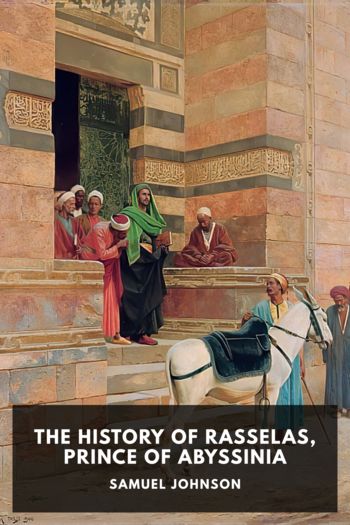The History of Rasselas, Prince of Abyssinia - Samuel Johnson (best novel books to read .TXT) 📗

- Author: Samuel Johnson
Book online «The History of Rasselas, Prince of Abyssinia - Samuel Johnson (best novel books to read .TXT) 📗». Author Samuel Johnson
By Samuel Johnson.
Table of Contents Titlepage Imprint Introduction The History of Rasselas, Prince of Abyssinia I: Description of a Palace in a Valley II: The Discontent of Rasselas in the Happy Valley III: The Wants of Him That Wants Nothing IV: The Prince Continues to Grieve and Muse V: The Prince Meditates His Escape VI: A Dissertation on the Art of Flying VII: The Prince Finds a Man of Learning VIII: The History of Imlac IX: The History of Imlac Continued X: Imlac’s History Continued—A Dissertation Upon Poetry XI: Imlac’s History Continued—A Hint of Pilgrimage XII: The Story of Imlac Continued XIII: Rasselas Discovers the Means of Escape XIV: Rasselas and Imlac Receive an Unexpected Visit XV: The Prince and Princess Leave the Valley, and See Many Wonders XVI: They Enter Cairo, and Find Every Man Happy XVII: The Prince Associates with Young Men of Spirit and Gaiety XVIII: The Prince Finds a Wise and Happy Man XIX: A Glimpse of Pastoral Life XX: The Danger of Prosperity XXI: The Happiness of Solitude—The Hermit’s History XXII: The Happiness of a Life Led According to Nature XXIII: The Prince and His Sister Divide Between Them the Work of Observation XXIV: The Prince Examines the Happiness of High Stations XXV: The Princess Pursues Her Inquiry with More Diligence Than Success XXVI: The Princess Continues Her Remarks Upon Private Life XXVII: Disquisition Upon Greatness XXVIII: Rasselas and Nekayah Continue Their Conversation XXIX: The Debate on Marriage Continued XXX: Imlac Enters, and Changes the Conversation XXXI: They Visit the Pyramids XXXII: They Enter the Pyramid XXXIII: The Princess Meets with an Unexpected Misfortune XXXIV: They Return to Cairo Without Pekuah XXXV: The Princess Languishes for Want of Pekuah XXXVI: Pekuah Is Still Remembered. The Progress of Sorrow XXXVII: The Princess Hears News of Pekuah XXXVIII: The Adventures of the Lady Pekuah XXXIX: The Adventures of Pekuah Continued XL: The History of a Man of Learning XLI: The Astronomer Discovers the Cause of His Uneasiness XLII: The Opinion of the Astronomer Is Explained and Justified XLIII: The Astronomer Leaves Imlac His Directions XLIV: The Dangerous Prevalence of Imagination XLV: They Discourse with an Old Man XLVI: The Princess and Pekuah Visit the Astronomer XLVII: The Prince Enters, and Brings a New Topic XLVIII: Imlac Discourses on the Nature of the Soul XLIX: The Conclusion, in Which Nothing Is Concluded Colophon Uncopyright ImprintThis ebook is the product of many hours of hard work by volunteers for Standard Ebooks, and builds on the hard work of other literature lovers made possible by the public domain.
This particular ebook is based on a transcription produced for Project Gutenberg and on digital scans available at the HathiTrust Digital Library.
The writing and artwork within are believed to be in the U.S. public domain, and Standard Ebooks releases this ebook edition under the terms in the CC0 1.0 Universal Public Domain Dedication. For full license information, see the Uncopyright at the end of this ebook.
Standard Ebooks is a volunteer-driven project that produces ebook editions of public domain literature using modern typography, technology, and editorial standards, and distributes them free of cost. You can download this and other ebooks carefully produced for true book lovers at standardebooks.org.
IntroductionRasselas was written by Samuel Johnson in the year 1759, when his age was fifty. He had written his London in 1738; his Vanity of Human Wishes in 1740; his Rambler between March, 1750, and March, 1752. In 1755 his Dictionary had appeared, and Dublin, by giving him its honorary LL.D., had enabled his friends to call him “Doctor” Johnson. His friends were many, and his honour among men was great. He owed them to his union of intellectual power with unflinching probity. But he had worked hard, battling against the wolf without, and the black dog within—poverty and hypochondria. He was still poor, though his personal wants did not exceed a hundred pounds a year. His wife had been seven years dead, and he missed her sorely. His old mother, who lived to the age of ninety, died poor in January of this year, 1759. In her old age, Johnson had sought to help her from his earnings. At her death there were some little debts, and there were costs of burial. That he might earn enough to pay them he wrote Rasselas.
Rasselas was written in the evenings of one week, and sent to press while being written. Johnson earned by it a hundred pounds, with twenty-five pounds more for a second edition. It was published in March or April; Johnson never read it after it had been published until more than twenty years afterwards. Then, finding it in a chaise with Boswell, he took it up and read it eagerly.
This is one of Johnson’s letters to his mother, written after he knew that her last illness had come upon her. It is dated about ten days before her death. The “Miss” referred to in it was a faithful friend. “Miss” was his home name for an affectionate stepdaughter, Lucy Porter:—
“Honoured Madam—
“The account which Miss gives me of your health pierces my heart. God comfort and preserve you, and save you, for the sake of Jesus Christ.
“I would have Miss read to you from time to time the Passion of our Saviour; and sometimes the sentences in the Communion Service beginning—‘Come unto me, all ye that travail and are heavy laden, and I will give you rest.’
“I have just





Comments (0)